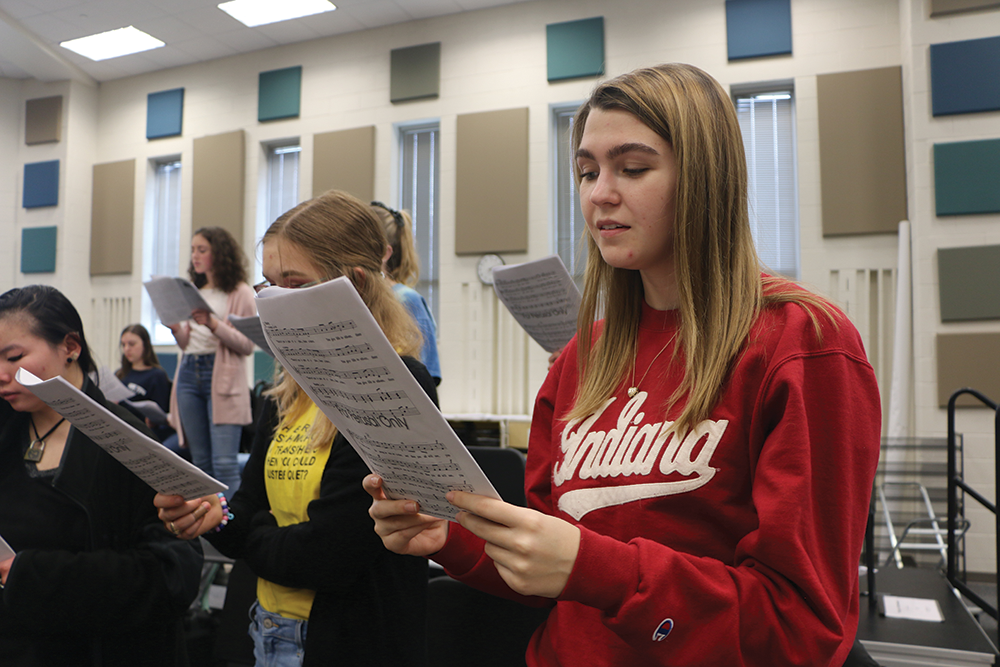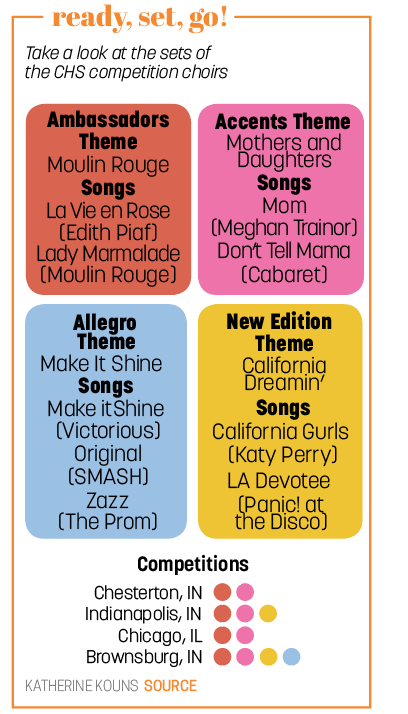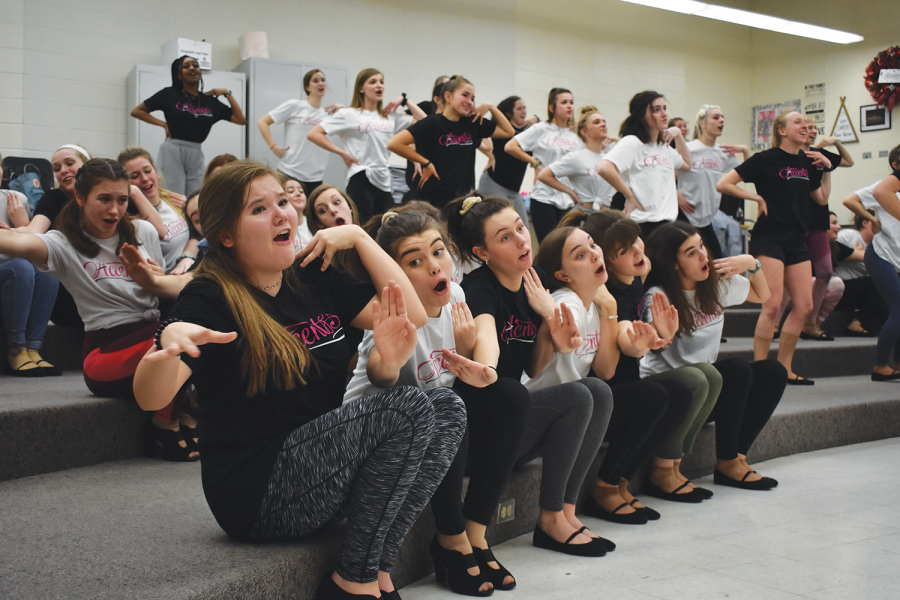Yumi Colombo, Accents member and junior, spends her SRT in room P118 working with her choir director to perfect the dances the Accents are learning for their competition set. When Colombo isn’t in SRT for choir, she also attends required evening rehearsals, where she gets to sing and dance with her closest friends. All of this effort is put forth to ensure she’s doing her part to help the Accents be the best they can be on competition days—like the competition in Chicago on March 5.
Colombo said while preparations for the four competitions the Accents participate in can be stressful, the choir’s hard work is worth it because these competitions allow choir members to work toward a bigger purpose, which alternatively helps them to bond and become closer as a group.
“I think competition is a great way to bond because when you are on your way to a competition, when you are on buses, when you’re preparing and having those sets, you have the mindset of having one common goal and we’re one team that needs to get to that goal, you definitely bond more because you are all trying to get to the same thing, which is just winning or trying your best or having fun,” Colombo said.

WORK HARD, SING HARD:
Emme Walschlager, Allegro member and senior, sings during her choir class. Walschlager said competing allowed the choir to work harder towards a higher goal.
However, it’s not just about hanging out with friends or winning a trophy for members of Carmel Choirs. Kyle Barker, associate director of choirs, said he uses competition as a tool to help choir students achieve a greater goal of excellence. Preparing to compete helps members of Carmel Choirs pay more attention to detail, helping them to become better performers overall.
“We have a lot of ways to try and motivate people and get them to be the best versions of themselves, and competition is a great way to do that,” Barker said. “When you’ve got the extra goal of knowing you’re going to be judged by people that are highly qualified in the field, you’re going to be seen by schools across the country and you’re going to be going up against them too, it makes your work process—just like a sport—it’s going to make that process that much more intense. You’re going to be more detail oriented. You’re going to rehearse more frequently.”
For Emme Walschlager, Allegro member and senior, rehearsing for competition has changed her outlook on choir. Prior to this school year, Allegro only competed as a concert choir. This year, however, they will be participating in one show choir competition. But this is Walschlager’s first year competing in a choir.
“I feel like I have a bigger purpose. I feel like it’s more fun prepping for things outside of regular concerts,” Walschlager said. “It’s fun to have our own individual things and to have our own individual set that’s catered towards us.”

Walschlager said she feels that working toward a competition has caused her choir to become closer as a family and also helped members of Allegro to work harder because they’re working towards a higher goal.
“I feel as if we’re working harder because we’re working towards something bigger than just ISSMA or just a song we’re performing at one of our concerts. It’s something that we’re all excited about,” Walschlager said. “I think that having a competition, even if it’s just one for Allegro, is important because it bonds us together and kind of helps make a community amongst us because we’re working together more than we would’ve been in the past.”
This year is Colombo’s second year competing at show choir competitions and said that while she does enjoy competing and loves how much closer she feels with her fellow members of Accents because of it, she feels the competition mindset can get out of hand and become toxic.
“Competition is easily toxic if you are the one to increase that toxicity or you’re the one to help it grow,” Colombo said. “But if you’re the one who focuses on the positivity and the greatness of competition, it can improve the whole environment and make everyone else feel more positive. It’s all about mentality. If you have the right mentality, usually competition is fun and nice.”
When it comes to how competitive competitions can be, Barker said he believes that while it can be difficult to try not to focus too much on winning, competition at its core is about helping choirs achieve a higher bar of excellence that wouldn’t be possible without competing.
“There’s a lot of speculation amongst music teachers about whether competitive music is something that should be fostered because the whole idea of the love of music and the expression it creates is something that sometimes differs in areas of competition, but I feel like you’re able to (love and express music) better when you’re a better ensemble and if this helps us get there, then great,” Barker said. “I think it can be dangerous if the only goal is the trophy, but I feel really strongly that it’s a really good tool to use.”

































![AI in films like "The Brutalist" is convenient, but shouldn’t take priority [opinion]](https://hilite.org/wp-content/uploads/2025/02/catherine-cover-1200x471.jpg)









































![Review: “The Immortal Soul Salvage Yard:” A criminally underrated poetry collection [MUSE]](https://hilite.org/wp-content/uploads/2025/03/71cju6TvqmL._AC_UF10001000_QL80_.jpg)
![Review: "Dog Man" is Unapologetically Chaotic [MUSE]](https://hilite.org/wp-content/uploads/2025/03/dogman-1200x700.jpg)
![Review: "Ne Zha 2": The WeChat family reunion I didn’t know I needed [MUSE]](https://hilite.org/wp-content/uploads/2025/03/unnamed-4.png)
![Review in Print: Maripaz Villar brings a delightfully unique style to the world of WEBTOON [MUSE]](https://hilite.org/wp-content/uploads/2023/12/maripazcover-1200x960.jpg)
![Review: “The Sword of Kaigen” is a masterpiece [MUSE]](https://hilite.org/wp-content/uploads/2023/11/Screenshot-2023-11-26-201051.png)
![Review: Gateron Oil Kings, great linear switches, okay price [MUSE]](https://hilite.org/wp-content/uploads/2023/11/Screenshot-2023-11-26-200553.png)
![Review: “A Haunting in Venice” is a significant improvement from other Agatha Christie adaptations [MUSE]](https://hilite.org/wp-content/uploads/2023/11/e7ee2938a6d422669771bce6d8088521.jpg)
![Review: A Thanksgiving story from elementary school, still just as interesting [MUSE]](https://hilite.org/wp-content/uploads/2023/11/Screenshot-2023-11-26-195514-987x1200.png)
![Review: "When I Fly Towards You", cute, uplifting youth drama [MUSE]](https://hilite.org/wp-content/uploads/2023/09/When-I-Fly-Towards-You-Chinese-drama.png)
![Postcards from Muse: Hawaii Travel Diary [MUSE]](https://hilite.org/wp-content/uploads/2023/09/My-project-1-1200x1200.jpg)
![Review: "Ladybug & Cat Noir: The Movie," departure from original show [MUSE]](https://hilite.org/wp-content/uploads/2023/09/Ladybug__Cat_Noir_-_The_Movie_poster.jpg)
![Review in Print: "Hidden Love" is the cute, uplifting drama everyone needs [MUSE]](https://hilite.org/wp-content/uploads/2023/09/hiddenlovecover-e1693597208225-1030x1200.png)
![Review in Print: "Heartstopper" is the heartwarming queer romance we all need [MUSE]](https://hilite.org/wp-content/uploads/2023/08/museheartstoppercover-1200x654.png)




